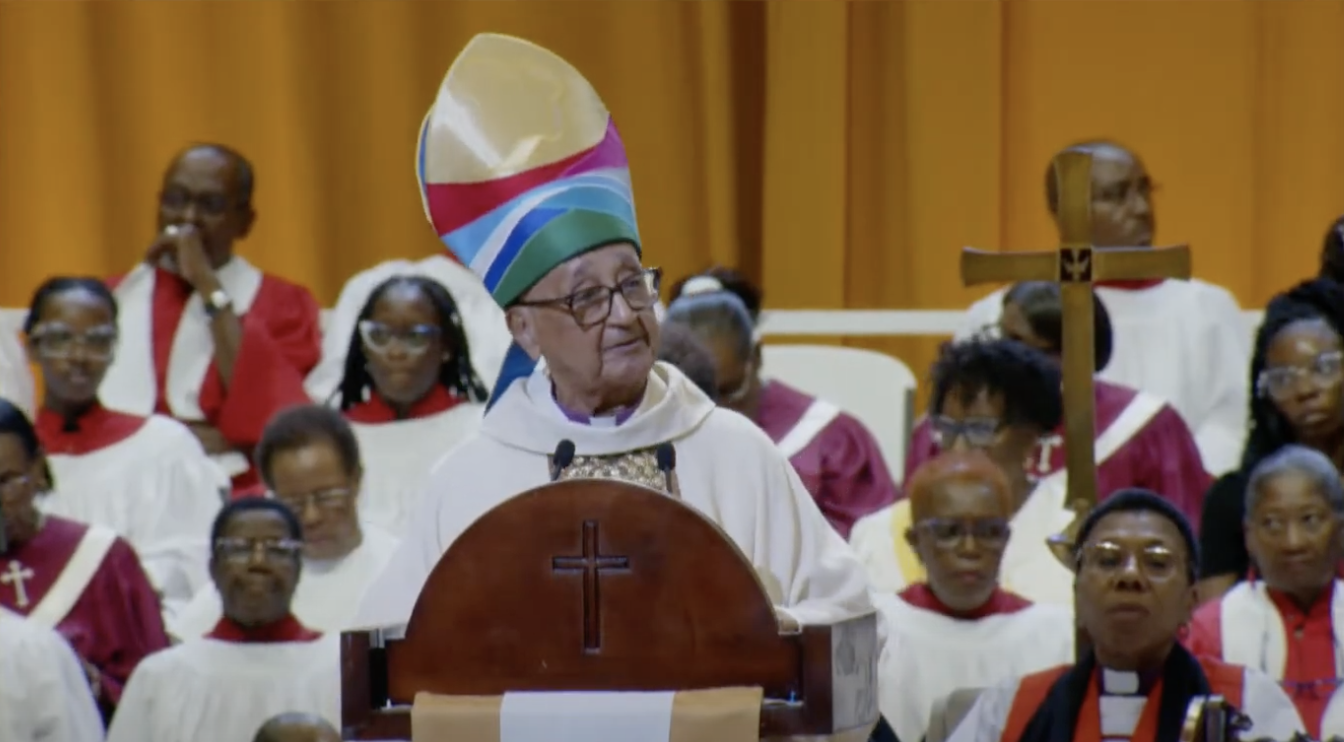Anglican Diocese in Barbados Urged to Lead 'Fundamental Reset' for Community and Church: Archbishop Gomez

July 23, 2024
The Anglican Diocese in Barbados marks its bicentennial with a call for spiritual renewal and moral revival, addressing societal values and the church's role in faith formation. Archbishop Gomez advocates for intentional Christian character formation.
The Anglican Diocese in Barbados has been called upon to spearhead a ‘fundamental reset’ within both the church and broader community as it celebrates its bicentennial, according to retired Archbishop Drexel Gomez.
Speaking at a nearly four-hour service to commemorate the 200th anniversary of the Diocese of Barbados at the Wildey Gymnasium, attended by President Dame Sandra Mason, Prime Minister Mia Mottley, and other Cabinet members, Archibishop Gomez, the first Caribbean-born Bishop of Barbados from 1972 to 1992, emphasised the “urgent need for spiritual renewal and moral revival”.
He expressed concern over the erosion of core societal values: “So many of our precious core values, strengths of resilient survival and creative resistance, prudent emulation, compassionate concern, solidarity with the poor, mutual upliftment, personal decency, visions of better tomorrows, courageous sacrifices, and courage for wisdom. All of these seem to be diminishing.”
Archbishop Gomez attributed this decline to “the unchecked rise of individualistic and materialistic tendencies”, which he believes has led to the suppression of “the collective and creative human spirit”.
Central to his address was a call for the church to embody Christlike values and act as a vehicle for faith formation.
“Each diocese must therefore ensure that at every stage of personal development, from infancy to adulthood, adequate provision is to be made for the promotion of growth in the knowledge and understanding of Christian faith and practice,” Archbishop Gomez explained.
The retired archbishop of the eight-diocese Church of the Province of the West Indies (CPWI) advocated for a more intentional approach to Christian character formation, including “youth empowerment, lay ministry, and clergy refreshment”.
He said: “Christian teaching is for people to assist in faith formation and to provide adequate funding, inclusive of available technology.”
Archbishop Gomez emphasised the church’s responsibility to serve as the moral conscience of the nation, urging it to address what he termed “five major contemporary evils”: greed, sexual depravity, abuse of power, corrupt communication, and cultural decay.
On the subject of greed, he declared: “Greed involves a selfish insistence on having or acquiring more without regard for the welfare and impact on other members of society.” He referenced St Paul’s teaching, urging contentment and moderation: “I have learned to be content with whatever I have.”
Addressing sexual depravity, Archbishop Gomez argued that it “challenges the intrinsic dignity of humanity and disrupts family life”. He critiqued the modern sexual revolution: “The so-called modern sexual revolution emphasises the freedom of human beings to engage in sexual activity without restraint.”
The abuse of power, particularly in political arenas, was also a focus of his address.
“The Christian model is given in Jesus, who came not to be served but to serve and to give his life as a ransom for men,” he said, denouncing the dehumanising effects of power abuse, including domestic violence and deteriorating family relationships.
The 11th Bishop of Barbados spoke out against corrupt communication: “Corrupt communication thrives on falsity, fakery, and malicious fiction.” He urged the church to combat falsehood and uphold truth in its teachings and communications.
Expressing gratitude for the church’s journey over the past 200 years, Archbishop Gomez called for a renewed commitment to spiritual and moral values.
“Today we give hearty thanks to the God who has brought us this far on our way for these 200 years as a diocese, still standing but not standing still,” he declared.
The retired archbishop concluded by urging the congregation to move forward with the Holy Spirit’s guidance, to “redouble every effort and every sinew of our collective will to teach the faith, to preach the word, and to heal the land we love”.
The Church of England was the official church from the island’s colonial settlement in 1627 until its disestablishment in 1969. William Hart Coleridge was the first Anglican bishop of Barbados when the see was created in 1824. Both Coleridge and his successor Thomas Parry, after whom the Coleridge and Parry secondary grammar schools were named between 1825 and 1852, oversaw the elaborate expansion of churches and schools throughout the years following emancipation.
For a half-century from 1877, Barbados was twinned with the Windward Islands. The first Barbados-born bishop, Gay Mandeville, was appointed in 1951. Three Barbadians have led the Anglican Diocese since Gomez’s departure from 1992 to the present time.


